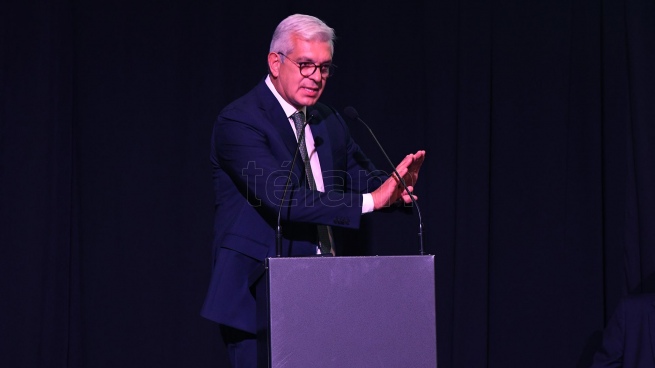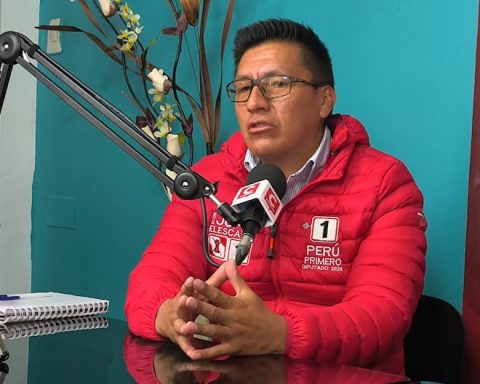The The national government will invest 350 million pesos in the creation of the Knowledge Technology Center for Viticultural and Agroindustrial Sustainability with an emphasis on water resources (Cetco) in Mendoza, to promote the growth of the productive sector, it was announced this Saturday during the celebrations for the Wine harvest Festival that take place in this capital.
The Minister of Science, Technology and Innovation, Daniel Filmusexplained that Cetco will be “a multidisciplinary institute that will bring together other parts and contributions to add value to the wine industry and technology transfer to the productive sectors.”
Along with representatives of @COVIAR1national and provincial officials signed an agreement for the construction of a multidisciplinary space that adds value to agro-industrial ecosystems and regional knowledge technologies.#FederalizationOfScience pic.twitter.com/pTcGOQyvGS
— Daniel Filmus (@FilmusDaniel) March 5, 2022
The announcement was made this Saturday morning during the breakfast of the Argentine Wine Corporation (Coviar), which was also attended by the Minister of Agriculture and Fisheries of the Nation, Julián Domínguezwho stressed that “protecting producers, who grow and industrialize, is our most important challenge.”
Dominguez noted that in a decade the sector will receive 90 million dollars and considered “important that the investment be in our producers” and maintained that wine production “is a model in which all chains should refer to ourselves.”
“Viticulture is the activity that generates the most employment per hectare, which is why all the financing tools are aimed at production. There are two country models: one that promotes production and the other that benefits financial speculation,” said the minister. .
In this sense, he detailed some of the benefits received by the sector, fundamentally the elimination of export duties for those who export up to 500,000 dollars a year, and the reduction for those who export up to one million dollars, a segment that “represents 80 percent of the producers”.
? We instituted the Council for the Administration of the #PROVIARIIintegrated to @agriculturaar, @invargentina and COVIAR. We will launch the second stage which, in a decade, already involves 90 million dollars.
? We will contribute 900 million pesos to combat lobesia botrana. pic.twitter.com/sIiMfhe6Bk– Julian Dominguez (@DominguezJul) March 5, 2022
The project is part of the Inter-institutional Centers on Strategic Issues Program (Cites) of the Undersecretary of Institutional Coordination of the Secretariat of Scientific-Technological Articulation of the MINCyT.
During the act held in a hotel in the capital of Mendoza and in the midst of the harvest celebrations, the Ministries of Science, Technology and Innovation and that of Agriculture, Livestock and Fisheries; the Conicet; the National Water Institute (INA); the National Institute of Viticulture (INV) and the National Technological University (UTN) signed an act of commitment to carry out its constitution and agree on the bases.
Also signed a agreement between Conicet and Coviar for the development of a tool for calculating environmental footprintswhich will allow producers to determine performance indicators such as the water and carbon footprint for their product and the wine chain.
It is a project that responds to the needs of wine producers in the town of San Rafael, south of Mendoza, but with a view to extending it to other users in the sector.
Viticulture is a development model to be imitated throughout our agro-bioindustry: they were clear about where they wanted to take Argentine wine, how they should do it, and they succeeded.
– Julian Dominguez (@DominguezJul) March 5, 2022
“The idea is to fundamentally add value to the wine activity chain, and we are working on a job that can be carried out because the Science and Technology Financing Law was approved this year, which provides for a federalization program for science to add value where primary production is,” Filmus told reporters.
“Argentina has a great development of science and technology, but 85% of the investments in science and technology are in the metropolitan area and in the central zone, and there really are enormous needs and contributions that science and technology can make. technology transfer to productive sectors such as viticulture and that are not being developed yet,” he said.
The The future Knowledge Technology Center for Viticultural and Agroindustrial Sustainability “will have an emphasis on water resources and is designed as a multidisciplinary space that accompanies the region in the process of joint transformation of its agro-industrial ecosystems and production of knowledge technologies 4.0″, detailed from the Science portfolio.
The plan is to create a more prosperous agricultural development, of better quality, and of a sustainable nature and based on the knowledge of the dynamics of scarce water resources in the context of climate change.
The international crisis has presented us with new challenges. We are facing a scenario of great uncertainty, but it is also time to strategically promote the best of our productions. With clear objectives, our agrobioindustry has no ceiling. pic.twitter.com/Eqw946gEy1
– Julian Dominguez (@DominguezJul) March 5, 2022
The institutions that will carry it forward They are the National Water Institute (INA) and the Andean Regional Center; the Conicet-CCT Mendoza; the National Technological University-Mendoza Regional Faculty (UTN-FRM), and the National Institute of Viticulture.
During breakfast this Saturday, the President of Coviar, José Zuccardicalled for the elimination of withholdings throughout the production chain and an exchange rate for exporters “that accompanies the macroeconomic fluctuations of the peso,” which “is essential if we want to continue with the growth trend in exports,” he said.
In another paragraph of his speech, Zuccardi rejected the Zero Tolerance At The Wheel plan, which he called “inapplicable, which does not solve the multi-causal problem of road accidents, which also modifies the eating and cultural habits of Argentines, harming their quality of life”.
In this regard, he appealed “to responsible and healthy wine consumption in all areas, maintaining the commitment to continue contributing to joint initiatives aimed at prevention and education.”
Later, at the Grape Harvest celebration of the Bodegas de Argentina Corporation, its president Patricia Ortíz recalled that “this last year, we have had to sharpen our creativity and ingenuity to overcome the difficulties that arose beyond economic issues, such as the shortage of bottles, logistics due to the lack of ships, the passage to Chile and juggling to keep the markets active.
“We are concerned about the drop in sales that, after the parenthesis of the pandemic, continues its course and whose origin is the lack of competitiveness, especially of wines from low segments, which are the most consumed and the ones that most impact the producers,” he said.
For the directive, “Public-private policies and agreements are necessary to promote consumption, such as the Wine District, under development in the City of Buenos Airesreplicable in other provinces and cities and abroad, work together with the embassies, as we have been doing, to the Tourism Market, promoting Argentina and its regional economies”.
“We aspire to a sustainable and integrated chain, supported by areas of innovation, science and economy of our universitieslet this be the path to growth that we seek so much”, Ortíz remarked and affirmed that “we have all the conditions to be at the forefront”.













